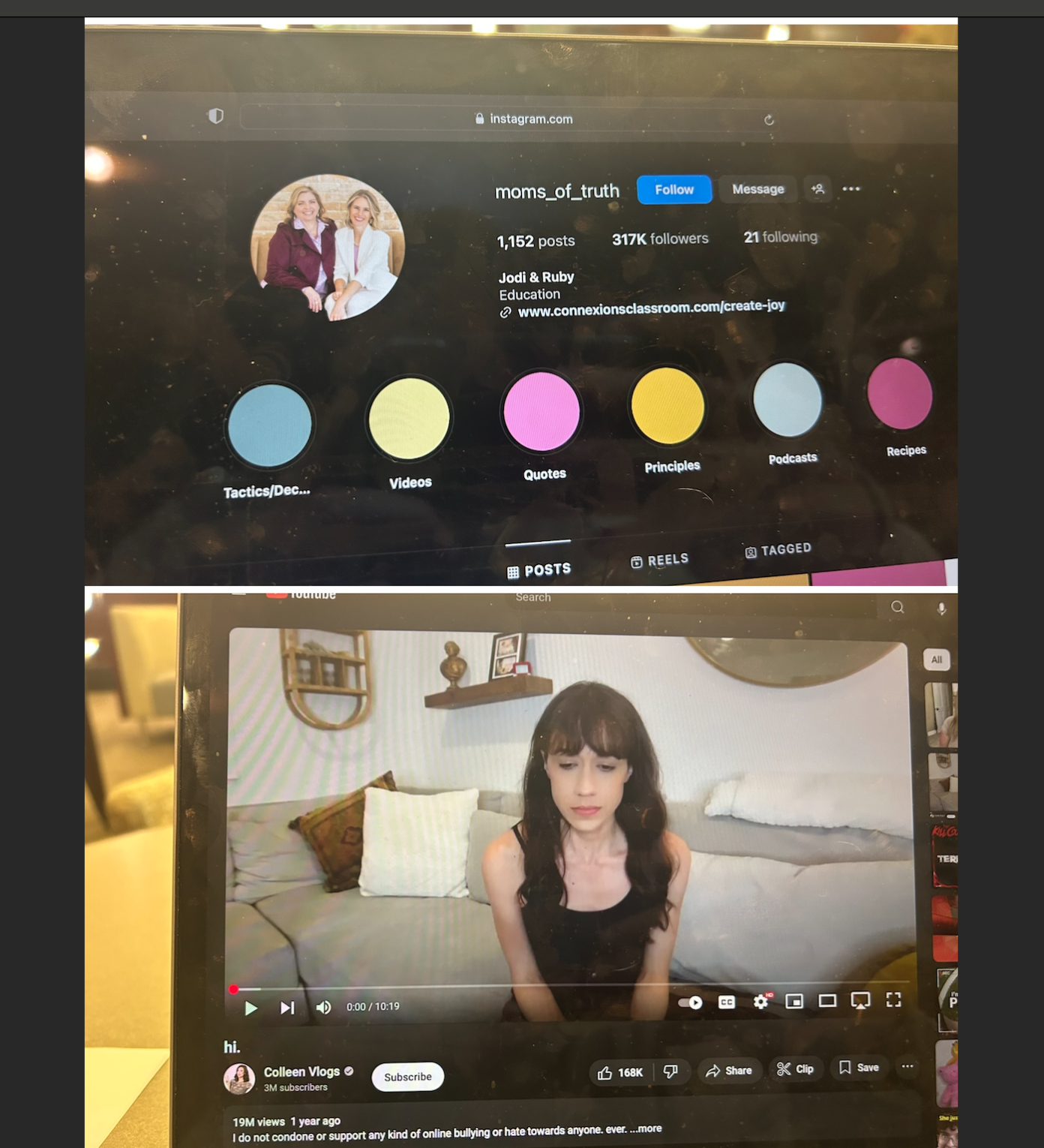(Top) The (now inactive) Instagram account formerly ran by YouTube personality Ruby Franke @moms_of_truth on Instagram
(Bottom) Colleen Ballinger’s infamous YouTube apology video, in which she sings “Toxic Gossip Train” Colleen Vlogs on YouTube
Edited with Collageable by the Xavierite
Growing up, I frequently watched family YouTube channels like The Ballinger Family, among a few others. Because I was so young, I never saw a problem with parents whose content was centered around the lives of their children.
However, in recent years, a number of family vloggers have proven to display harmful or even abusive behavior.
Recently, I took it upon myself to watch “Devil in the Family: The Fall of Ruby Franke,” a Hulu docuseries released on Feb. 27 that provides viewers with an account from the family of Ruby Franke, a former YouTube influencer/“mommy vlogger” who was arrested in Aug. 2023 on six counts of aggravated child abuse, of life with Franke behind the scenes in the years leading up to her arrest.
After watching the docuseries, I have pondered other family vlogging channels who, like Ruby Franke, have proven to be problematic.
Another instance that comes to mind is YouTube comedian and family vlogger Colleen Ballinger, sister of Chris Ballinger, one of the co-founders of the Ballinger Family account.
While there are no allegations of any kind regarding Colleen’s behavior towards her own three young children, a multitude of damning actions from her past resurfaced online in June of 2023, one being a video of Ballinger placing an underage girl named Becky in a suggestive position onstage at one of her live shows in 2018.
A more extreme example, similar to the case of Ruby Franke, is the DaddyOFive YouTube channel, which was run by Mike Martin, a Maryland father who would post videos physically and emotionally abusing his children, hiding the true, evil nature of his actions behind the label of “pranks.”
A common denominator between all of these parent vloggers is that they all partake in what has been coined as “sharenting,” which Wikipedia defines as “a portmanteau of ‘sharing’ and ‘parenting’ describing the practice of parents publicizing a large amount of potentially sensitive content about their children on internet platforms, most notably on social media.”
Franke and Martin in particular have been known to post horrifically intrusive content of their children. Franke, in one case, after her eldest son was expelled from school for repeated behavioral mishaps, posted a video to millions of subscribers detailing the expulsion.
Similarly, Martin would post so-called “prank” videos, often physically abusing his children and forcing his children to do the same to each other during them: in one instance, Martin had his stepson slap his daughter for not completing a water bottle flip successfully, after which the young girl is seen crying.
It seems that there is a trend of distasteful, unethical, and often illegal behavior within vlogger families. Chad Franke, the eldest child of Ruby Franke, who also has firsthand experience with a number of other family vloggers, seems to agree.
“The stuff that my mom did behind the scenes, like, you know, yelling, or ‘get back in place!’ or ‘say that again!’ or, you know, the sternness–that wasn’t just my mom—as well, I mean, a lot of, you know, vloggers and parents who are putting their kids on camera, they act the exact same way,” Chad Franke said in an interview with People magazine, recounting instances of other children he knew in vlogger families who suffered similar harsh treatment from their parents as he had from his own mother.
But, surely it can’t be all family vloggers. There must be some who are genuinely innocent people just trying to have fun and have a passion for sharing their lives with the world… right?
The issue, I would argue, is not whether or not family vloggers are well-intentioned people. It’s even possible that Ruby Franke began sharing her life on YouTube without any particular ill intentions (though what they morphed into is certainly up for debate).
However, intention does not always equal impact. Regularly forcing one’s own children to frequently do anything that only benefits a parent is inherently exploitative, whether these parents realize it or not.
Like many other things throughout history, family vlogging is often defended with reference to the intentions of the vlogger, rather than the impact of their actions. As a result, family vlogging remains a widely accepted practice.
I don’t suppose an influencer posting videos or photos with their child here and there is much of an issue, but when their private lives are constantly blasted all over online, especially not by their own doing, it honestly raises a huge red flag for me that something is off.
All too often, this has proven to be the case. This makes it immensely difficult for me to consume content that is heavily based on the creator’s underage children. There is a clear difference when a young person is making content on account of their own free will, and when a camera is simply shoved in front of their face for a parent’s page.
All of this gives reason as to why I am so viscerally in support of California’s decision to pass Senate Bill 764, which requires content creators whose content features children at least 30% of the time must set aside a proportionate percentage of the income made from said content for the child, who will have full access to those funds once they turn 18.
Because of the inherent exploitative nature of family vlogging when young children are heavily involved, especially when it is clearly their parents who are driving the content, it isn’t content I find I can enjoy consuming anymore.
